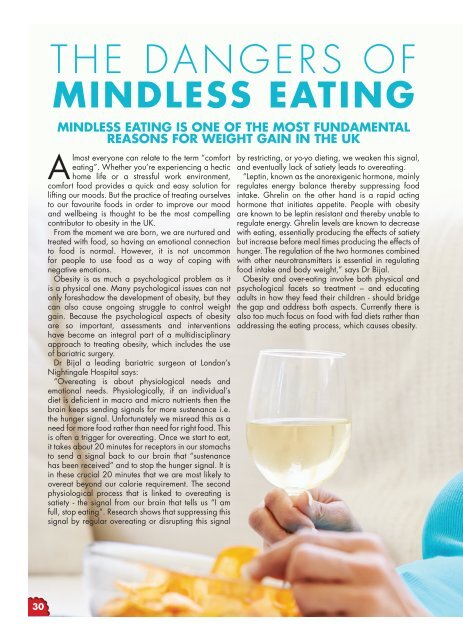Obese Britain Summer 2015.pdf
A magazine about Healthy Living, Weight Loss, Exercise and Dieting. Distributed with the Guardian on the 27th June 2015 www.obesebritain.com
A magazine about Healthy Living, Weight Loss, Exercise and Dieting. Distributed with the Guardian on the 27th June 2015 www.obesebritain.com
You also want an ePaper? Increase the reach of your titles
YUMPU automatically turns print PDFs into web optimized ePapers that Google loves.
THE DANGERS OF<br />
MINDLESS EATING<br />
MINDLESS EATING IS ONE OF THE MOST FUNDAMENTAL<br />
REASONS FOR WEIGHT GAIN IN THE UK<br />
Almost everyone can relate to the term “comfort<br />
eating”. Whether you’re experiencing a hectic<br />
home life or a stressful work environment,<br />
comfort food provides a quick and easy solution for<br />
lifting our moods. But the practice of treating ourselves<br />
to our favourite foods in order to improve our mood<br />
and wellbeing is thought to be the most compelling<br />
contributor to obesity in the UK.<br />
From the moment we are born, we are nurtured and<br />
treated with food, so having an emotional connection<br />
to food is normal. However, it is not uncommon<br />
for people to use food as a way of coping with<br />
negative emotions.<br />
Obesity is as much a psychological problem as it<br />
is a physical one. Many psychological issues can not<br />
only foreshadow the development of obesity, but they<br />
can also cause ongoing struggle to control weight<br />
gain. Because the psychological aspects of obesity<br />
are so important, assessments and interventions<br />
have become an integral part of a multidisciplinary<br />
approach to treating obesity, which includes the use<br />
of bariatric surgery.<br />
Dr Bijal a leading bariatric surgeon at London’s<br />
Nightingale Hospital says:<br />
“Overeating is about physiological needs and<br />
emotional needs. Physiologically, if an individual’s<br />
diet is deficient in macro and micro nutrients then the<br />
brain keeps sending signals for more sustenance i.e.<br />
the hunger signal. Unfortunately we misread this as a<br />
need for more food rather than need for right food. This<br />
is often a trigger for overeating. Once we start to eat,<br />
it takes about 20 minutes for receptors in our stomachs<br />
to send a signal back to our brain that “sustenance<br />
has been received” and to stop the hunger signal. It is<br />
in these crucial 20 minutes that we are most likely to<br />
overeat beyond our calorie requirement. The second<br />
physiological process that is linked to overeating is<br />
satiety - the signal from our brain that tells us “I am<br />
full, stop eating”. Research shows that suppressing this<br />
signal by regular overeating or disrupting this signal<br />
by restricting, or yo-yo dieting, we weaken this signal,<br />
and eventually lack of satiety leads to overeating.<br />
“Leptin, known as the anorexigenic hormone, mainly<br />
regulates energy balance thereby suppressing food<br />
intake. Ghrelin on the other hand is a rapid acting<br />
hormone that initiates appetite. People with obesity<br />
are known to be leptin resistant and thereby unable to<br />
regulate energy. Ghrelin levels are known to decrease<br />
with eating, essentially producing the effects of satiety<br />
but increase before meal times producing the effects of<br />
hunger. The regulation of the two hormones combined<br />
with other neurotransmitters is essential in regulating<br />
food intake and body weight,” says Dr Bijal.<br />
Obesity and over-eating involve both physical and<br />
psychological facets so treatment – and educating<br />
adults in how they feed their children - should bridge<br />
the gap and address both aspects. Currently there is<br />
also too much focus on food with fad diets rather than<br />
addressing the eating process, which causes obesity.<br />
30



